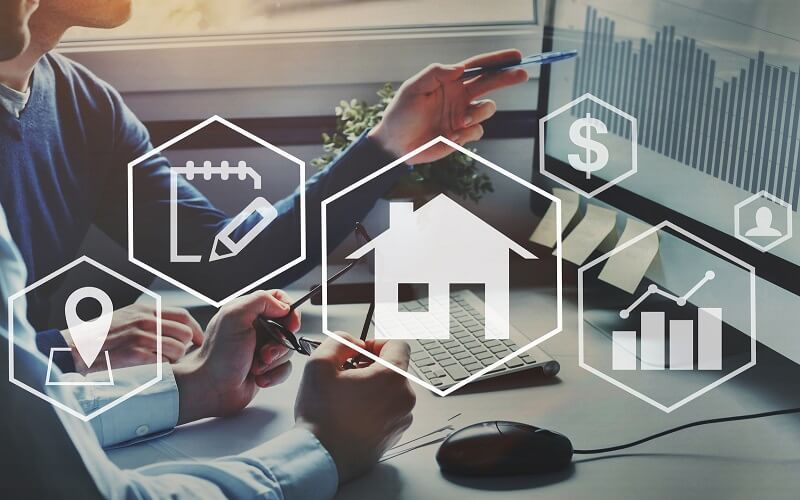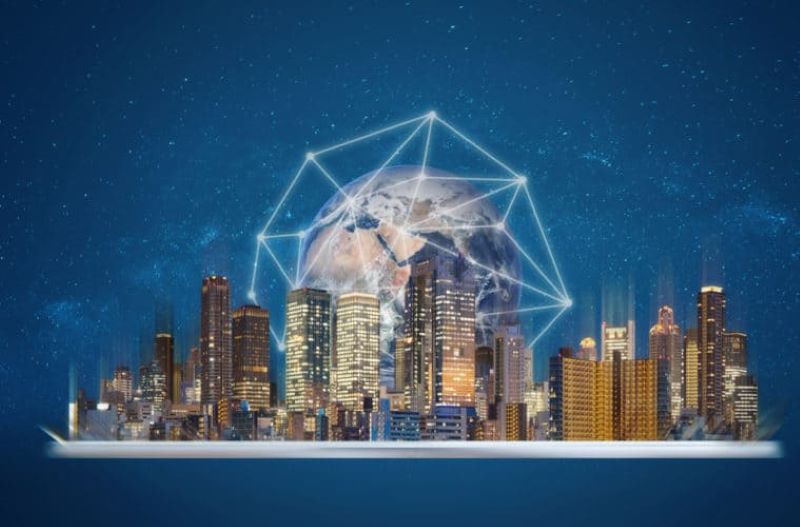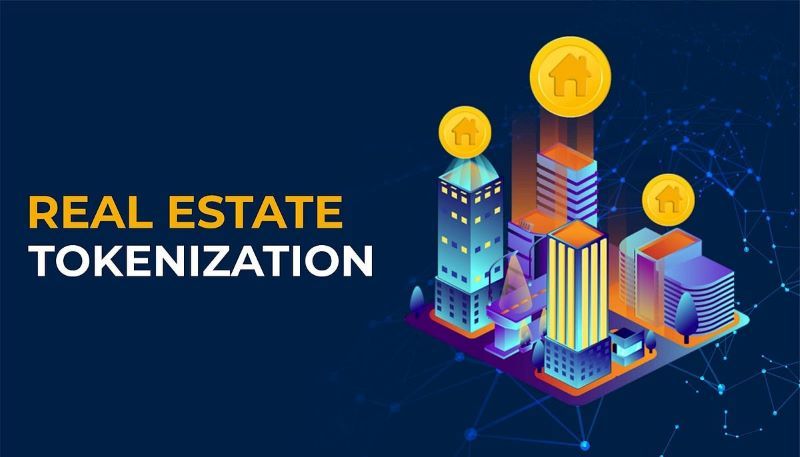What Is Tokenized Real Estate? This concept is revolutionizing the way we view real estate investments by enabling fractional ownership through blockchain technology. By digitizing real estate assets, tokenization unlocks global investment opportunities, allowing a broader range of investors to participate in markets that were once exclusive to the wealthy. Let’s explore right here.
What is tokenized real estate?
The Concept of Tokenized Real Estate
What Is Tokenized Real Estate? It’s the process of converting real estate ownership into digital tokens, enabling users to buy, sell, and trade real estate assets easily through blockchain technology. Each token represents a fraction of the real estate property, allowing for fractional ownership without the need to purchase the entire asset. This not only increases the liquidity of real estate but also reduces financial barriers, expanding investment opportunities for a wider range of investors.

Why Tokenized Real Estate Opens Up Global Investment Opportunities?
Tokenized real estate opens up numerous global investment opportunities due to its significant advantages. Firstly, thanks to blockchain technology, transactions can occur transparently and securely, making it easy for users to check property information and transaction history. This transparency and security are core aspects of what is tokenized real estate?
Secondly, tokenizing real estate lowers the barriers to entry for small investors, allowing them to invest in high-value properties that might have been previously out of their financial reach. This accessibility is another key feature that defines what is tokenized real estate?
Finally, tokenized real estate also enables investors to diversify their portfolios more effectively, as they can purchase tokens from various properties across the globe, thereby reducing risk and increasing potential returns.
How does Tokenized Real Estate Work?
The Tokenization Process
Tokenized real estate operates through the process of tokenizing real estate assets. First, a specific property is evaluated and analyzed to determine its value. Then, the property owner collaborates with technology companies to issue a certain number of tokens, with each token representing a fractional ownership share in that property. These tokens are recorded on a blockchain, creating an immutable and transparent record of ownership. To fully grasp this innovative approach, it’s essential to understand “What is tokenized real estate?” – it’s the process of converting real estate ownership into digital tokens on a blockchain.
Trading and Transfer
Once the tokens are issued, they can be traded on cryptocurrency exchanges or online real estate trading platforms. This allows investors to buy and sell tokens easily without having to go through the complex legal procedures often associated with traditional real estate transactions. Users simply need to create a digital wallet to store tokens and can conduct transactions with just a few clicks.

Asset Management and Profit Distribution
Tokenized real estate not only simplifies the buying and selling process but also enables more efficient asset management. Property management companies can use blockchain to track the property’s condition, from maintenance to rental income. At the same time, profits from the property will be automatically distributed to token holders through smart contracts, making the process fast and accurate. This streamlined management and distribution process is a key advantage of understanding “What is tokenized real estate?”
Transparency and Security
Finally, tokenized real estate offers greater transparency and security. All transactions and information related to the property are recorded on the blockchain, making it easy for investors to verify the origin and ownership. This not only reduces the potential for fraud but also increases trust among participants. The question “What is tokenized real estate?” is also about understanding how blockchain technology enhances transparency and security in real estate transactions.
Challenges of Tokenized Real Estate in the Global Market

- Unclear Regulatory Framework: One of the biggest challenges for Tokenized Real Estate is the lack of a clear regulatory framework in many countries. Regulations related to real estate tokenization are still nascent and not uniformly applied. This can create difficulties for investors and development companies in complying with legal regulations, leading to uncertainty in investment and trading. This lack of clarity often leads to the question, “What is tokenized real estate?” and how it fits within the existing legal framework.
- Security Concerns: Although blockchain is known for its high security, there are still concerns about protecting digital assets. Cyberattacks, fraud, and hacking can lead to the loss of assets or sensitive information. This reduces investor confidence in the tokenized real estate model, especially when they have to face security-related risks. The question, “What is tokenized real estate?” often arises in the context of security concerns, as investors seek to understand how blockchain technology addresses these challenges.
- Changes in Investment Habits: The traditional way of investing in real estate is deeply ingrained in the mindset of many investors. Transitioning to a tokenized investment model requires investors to change their habits and perceptions of asset value. Many people still don’t fully understand how tokenization works and the benefits it offers, leading to slow adoption of this model. Understanding “What is tokenized real estate?” and its advantages is crucial for overcoming this challenge.
- Limited Liquidity: While tokenized real estate offers higher liquidity compared to traditional real estate, there are still challenges in executing transactions. The tokenization market is not yet large enough and lacks uniform development, which can lead to limited liquidity and difficulties in buying and selling tokens at a specific time.
- Technology-Related Costs: Implementing blockchain technology and building a tokenization system requires significant costs for real estate companies. This includes developing the technology platform, asset management, and legal expenses. These costs can affect the price of tokens and their competitiveness in the market, reducing the attractiveness of tokenized real estate investment.
The Future of Tokenized Real Estate and Global Investment Opportunities

- Enhanced Transparency and Fairness: One of the significant future trends of Tokenized Real Estate is its ability to create a more transparent system in real estate investment. With blockchain technology, all transactions will be recorded clearly and immutably, enhancing transparency. This not only protects the interests of investors but also enables small investors to participate in the real estate market, thereby promoting fairness in investment opportunities. To fully grasp the potential of this trend, it’s essential to understand the fundamental question: What Is Tokenized Real Estate?
- Global Market Expansion: Tokenized Real Estate has the potential to expand globally, enabling investors from different countries to easily participate in real estate markets in places they have never had the opportunity to before. By reducing geographical barriers, users can invest in remote assets without physically being present at the location, thereby increasing the diversity of their investment portfolios. This global accessibility is a key aspect of What Is Tokenized Real Estate?
- Interoperability Between Platforms: In the future, we may see the development of platforms that allow interaction between different tokenized assets. This means investors can easily convert and manage various types of tokenized assets on a single platform, from real estate to other digital assets. This interoperability not only creates a more flexible investment ecosystem but also opens up new opportunities for investors. The ability to interact with other tokenized assets is another crucial element of What Is Tokenized Real Estate?
- Integration of Artificial Intelligence and Data Analysis: The application of artificial intelligence (AI) and data analysis in Tokenized Real Estate can create new investment opportunities. AI can help predict price trends and analyze factors impacting the real estate market, thereby assisting investors in making more accurate decisions. Investors will be able to use big data to identify better investment opportunities and optimize their investment strategies.
- Innovation in Investment Models: Finally, Tokenized Real Estate will continue to innovate traditional investment models, allowing for crowdfunding and other forms of investment to emerge. Enabling multiple people to pool their capital to invest in a real estate project will create an attractive investment model, not only for individual investors but also for financial institutions.
The future of Tokenized Real Estate promises to be a dynamic field, opening up many global investment opportunities for everyone.
Understanding “What Is Tokenized Real Estate” is crucial for investors looking to explore innovative avenues in the global market. By merging traditional real estate with cutting-edge blockchain technology, tokenization opens up a world of opportunities, enabling greater accessibility and transparency in investments. As the landscape continues to evolve, platforms like Blockchain Global Network will play a vital role in educating and guiding investors through this exciting transformation.

RELATED POSTS
Arch Network Airdrop: Detailed guide on how to participate
Arch Network is an innovative...
Is DeepSeek a Public Company?
Curious about the future of...
Kishu Inu Coin: A guide to investing in this Meme Token
Discover Kishu Inu Coin, a...
Towns Airdrop – Expert Experience in Mining
To optimize benefits from the...
What is Tokenized Real Estate? – Unlocking Global Investment Opportunities
What Is Tokenized Real Estate?...
Forgotten Runiverse: A promising NFT Game on Ronin Network
Forgotten Runiverse is emerging as...
Unveiling the secrets of blockchain technology meaning
What if the key to...
Helios consensus: The engine powering U2U Chain’s blockchain revolution
Ever wondered how U2U Chain...
Tomarket Airdrop – Explosion of the Super Countdown Event
The Tomarket Airdrop event is...
Exploring the Use of blockchain technology in different sectors
The use of blockchain technology...
How Base L2 Sequencers are enabling the next generation of blockchain innovation
The evolution of blockchain technology...
W-coin Airdrop offers a unique tap-to-earn experience
Combined with the powerful TON...
Fundamental vs technical analysis in cryptocurrency investment
Fundamental vs technical analysis plays...
Grindery Airdrop – Earn G1 and GX Tokens Easily!
Grindery airdrop, supported by Binance...
Top 3 Secrets behind Bitcoin Peak that you must know
The rise and fall of...
DePIN Alliance Airdrop – Extremely HOT VTIS 2024 Event
DePIN Alliance Airdrop – Highlight...